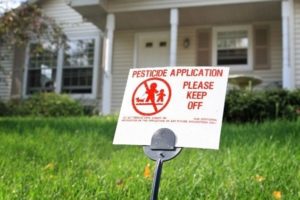 Pesticides
Pesticides
Pesticides are a variety of chemicals used to kill pests, such as insects or weeds. Many different kinds of synthetic pesticides are used in agriculture or in home-use products.
How am I exposed?
Exposures can come from workplace contact with chemicals, pesticide residues on the food we eat, products we use in our homes and on our bodies, and the quality of air and water in our communities.
Why should I be concerned?
Some pesticides are neurotoxic to humans and animals and they can also cause reproductive effects and damage to DNA. Occupational exposures are of particular concern due to frequency of use and contact.
What can government and business do?
The US EPA should ban pesticides that are bio-accumulative, known to be hazardous and pervasive in the environment and our bodies, require pesticide manufacturers to report detailed information on the production, sales and use of their products, and make this information available to the public.
Businesses should look to alternative methods for controlling agricultural pests like integrated pest management (IPM) and organic farming, gardening and residential pest control strategies.
How can I reduce my exposure?
- Buy USDA certified organic produce. If you are on a limited budget, look for organic choices for the produce that you eat the most of. Check out the Environmental Working Group’s Shopper’s Guide to Pesticides in Produce.
- If organic isn’t an option, make sure to thoroughly wash your fruits and vegetables before eating.
- Use alternatives to pesticides in your home and garden. There are many non-chemical methods of pest control that are safe and effective, such as using traps and barriers and removing pests physically.
Additional Resources
Toxic Free Future: Pesticides
Toxic Free Future provided resources for this page.
